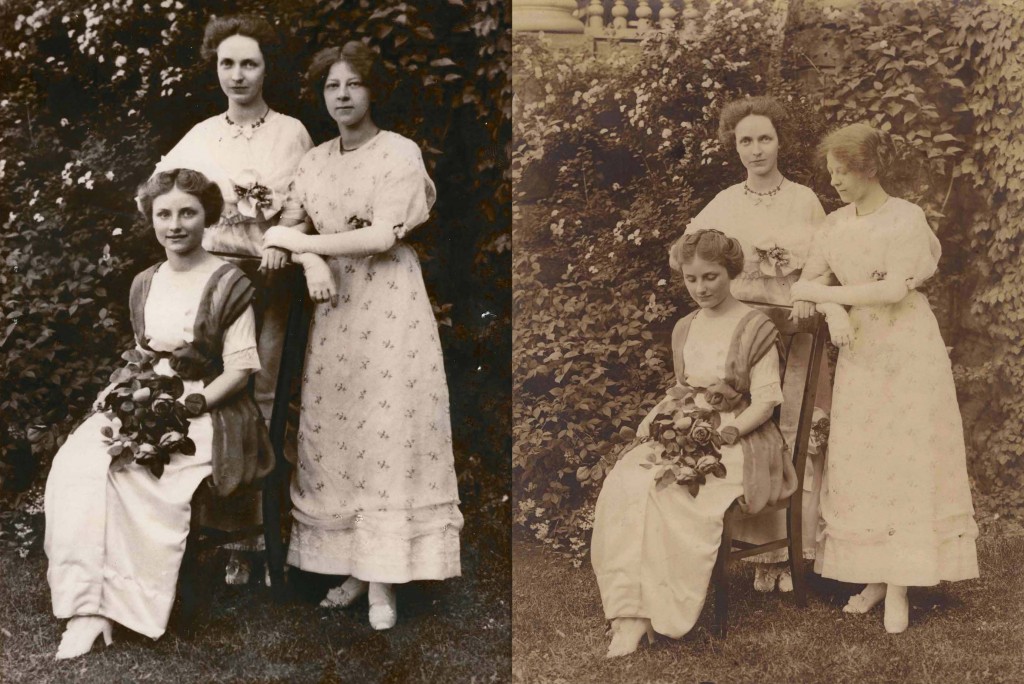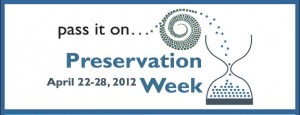This year, Wednesday May 2nd is Moving Up Day (MUD), a celebration of moving on to the next year of study. Until 1974, MUD was marked by a parade with elaborate student floats, celebratory dinner, and naming of the Moving Up Day queen.


First D'Youville graduates, 1912. Sitting: Pauline Garnett. Standing (l to r): Mary Brennan, Elizabeth Gosselin.
100 years ago, Pauline Garnett, Mary Brennan, and Elizabeth Gosselin became the first graduates of D’Youville College. The event was held in the College Auditorium (now the Kavinoky) and was reported by Nanette Lancaster (class of 1913) in the D’Youville Magazine*:
Cardinal Farley presented the diplomas to the graduates, after which Bishop Colton placed upon each one the hood significant of the degree she received. Those who had completed the course prescribed by the institution and were entitled to the degree of Bachelor of Arts were Miss Mary Brennan of Medina, NY, who received special honours in Latin, English and Pedagogy; Miss Pauline Garnett of Buffalo, who received her degree with special honours in History, English and Pedagogy; and Miss Elizabeth Gosselin of Redford, NY, with special honours in French and Pedagogy. Miss Helena Sheehan of Buffalo, BA of Trinity College, 1911, who took a post-graduate course at D’Youville in English and Aesthetics, received the degree of Master of Arts. Miss Elizabeth Cronyn, of Buffalo, because of her distinguished accomplishments in music, her splendid and successful efforts to elevate musical taste in Buffalo, and to establish high ideals of artistic musical performance, also because of her beautiful, Christian womanliness, received the degree of Doctor of Music.
This year’s graduation ceremony will be held at Kleinhan’s Music Hall, Saturday, May 19 at 9:00 am. More information on tickets, graduation events and festivities can be found here.
*”Commencement Week,” by Nanette Lancaster. D’Youville Magazine, vol. 5 no. 3 (July 1912).
 The American Library Association, Society of American Archivists, Library of Congress and other organizations have started the Preservation Week initiative to
The American Library Association, Society of American Archivists, Library of Congress and other organizations have started the Preservation Week initiative to
raise awareness about collecting and preservation, to connect the general public to preservation information and expertise, and to emphasize the close relationships among personal, family, community, and public collections and their preservation.*
Are you a genealogist? Do you have family photos, diaries, old books, or other collectibles and memorabilia? Here are a few resources to help you take care of those items and organize your research.
Organizing Family Papers
Conducting an Oral History Interview
How to care for Books
How to care for Photographs
How to care for Textiles, Quilts, and Clothing
Caring for Paper and Works of Art on Paper [Drawings, Watercolors, etc.]
There was a group of painters who became identified specifically with the painting of beautiful women rather than the general concept of beauty in art…. It is in this spirit, the masculine appreciation of feminine appearance, that the 1890s and the turn of the century witnessed the publication of several books dedicated to the beauty of women in art….
Among these books was Theodore Child’s A Mirror of Fair Women: Studies in Beauty and Elegance, published by Harper and Brothers in 1892. The D’Youville College Archives holds a selection of engravings and etchings from this work, some of which can be viewed here:
*Quote taken from Bailey Van Hook’s Angels of Art: Women and Art in American Society, 1876-1914. Published by Penn State Press, 2004, pp.165.
end – papers n.
the blank leaves at the beginning and end of a book, pasted to the inside front and back covers and first and last pages.
Before books were mass-produced, it was common for endpapers to include maps, marbling, or other ornament. Endpapers are functional and serve to help support and strenthen the book, but they can also be quite beautiful. These examples are from books held in the D’Youville College Archives:
Although today most endpapers are blank, children’s books, in particular picture books, often still contain ornamented endpapers:
The William G. Fargo mansion at 51 Niagara was adjacent to what is now the D’Youville campus (Fargo Avenue is named after William Fargo). Fargo was born May 20, 1818 in Pompey, New York, and “commenced life financially at the bottom of the ladder,”¹ working as a grocery clerk and express messenger. In 1851, he started Wells Fargo and Company with Henry Wells. He served as mayor of Buffalo, 1862-1866, and from 1868 to his death in 1881, was president of American Express.
Fargo built his mansion in 1872; it was demolished a mere 29 years later in 1901. At over 20,000 square feet, the home was expensive to maintain. Fargo’s wife died in 1890 and the house was vacant thereafter. In today’s dollars, it is estimated to have cost almost $10 million to build and furnish the home.
For more information and interior images on the William G. Fargo mansion, visit the Western New York Heritage.
Sources:
1 “Close of a Busy Career,” The New York Times, August 4, 1881.
2 “Fargo Estate: Then and Now,” Western New York Heritage
3 Image of Fargo home, D’Youville College Archives, Picture Gallery: A02.
The D’Youville College Archives has an extensive collection of photographs documenting commencements, buildings, student activities, and the beginnings of the College. Fortunately, former College Archivist Sister Mary Kathleen Duggan created an index to each photo with descriptive captions and dates (thank you Sister!). This Picture Gallery Index is now available online.
Search the index 2 ways:
1. Keyword search by using the Ctrl-F function [hold the “control” key and hit “f”].
2. Browse the index by category. The index is organized in 5 series: Beginnings, Commencements, Baccalaureate Ceremonies, Buildings, and Student Activities.
Any questions on using the index or to access images described in the index, contact the Archives at 829.8155 or vilza@dyc.edu.